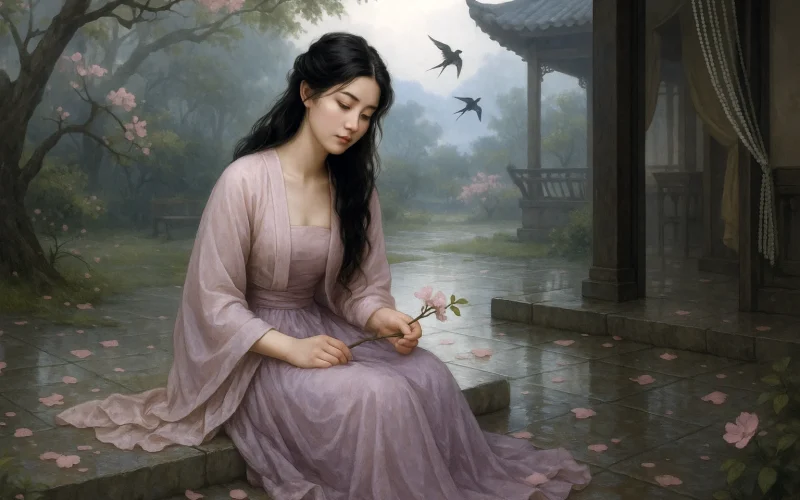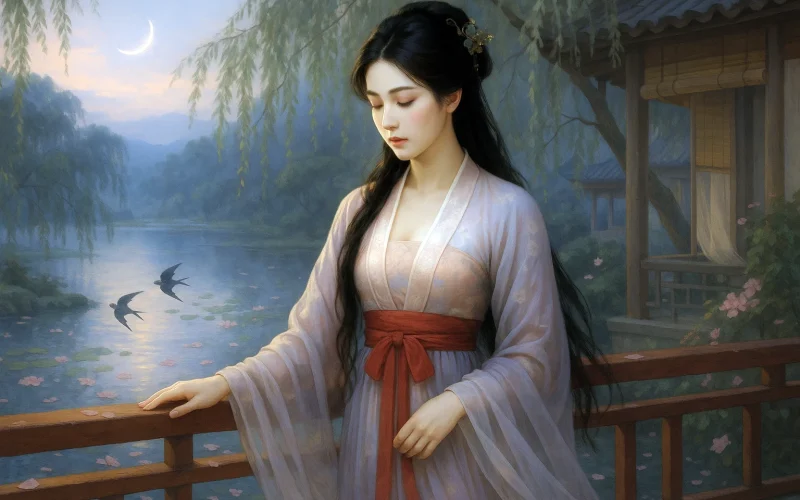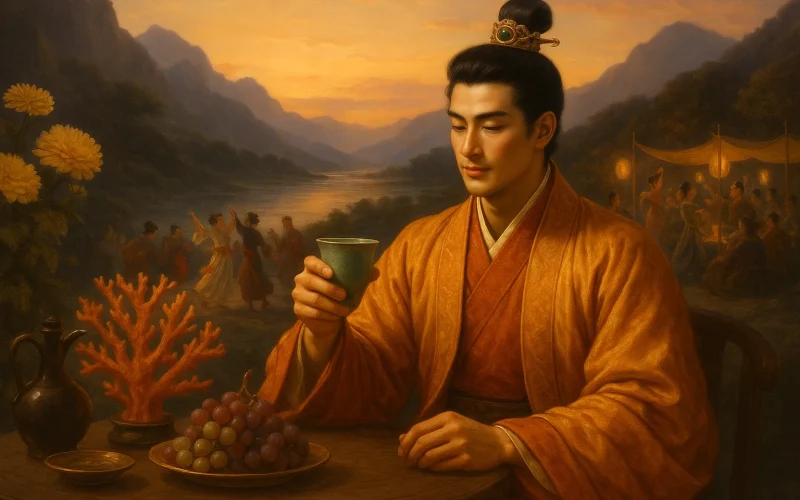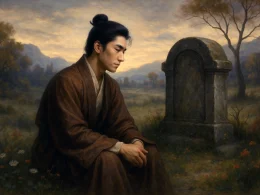Spring fades as rain departs our little yard,
Petals flutter away, shard by shard.
Alone I break a withered twig in sigh,
Silent by the rail—only my heart knows why.
Pearled halls warm with incense, screens uprolled,
Paired swallows return as of old.
You promised a reunion sweet—
But can golden hours and youth ever meet?
Original Poem
「采桑子 · 小庭雨过春将尽」
冯延巳
小庭雨过春将尽,片片花飞,独折残枝,无语凭阑秪自知。
玉堂香煖珠帘卷,双燕来归,君约佳期,肯信韶华得几时。
Interpretation
This exquisite ci, composed during Feng Yansi's later years, captures a boudoir lady's profound meditation on time's erosion of beauty and love's impermanence amidst late spring scenery. As a leading Southern Tang poet who witnessed his dynasty's precarious existence, Feng imbues the poem with subtle existential unease—where falling petals and returning swallows become metaphors for transience and unfulfilled longing. The work exemplifies his mature style: deceptively simple imagery layered with psychological complexity.
First Stanza: "小庭雨过春将尽,片片花飞,独折残枝,无语凭阑秪自知。"
Xiǎo tíng yǔ guò chūn jiāng jìn, piàn piàn huā fēi, dú zhé cán zhī, wú yǔ píng lán zhī zì zhī.
In the small courtyard, rain passes—spring nears its end.
Petals flutter down one by one.
Alone, I snap a withered twig,
lean on the railing wordlessly—
this desolation, only my heart knows.
The stanza opens with cinematic precision: "rain passes" (雨过) marks both meteorological and seasonal transition, while "spring nears its end" (春将尽) resonates with personal and dynastic twilight. The slow-motion "petals flutter down" (片片花飞) visualizes time's granular erosion, with "one by one" emphasizing cumulative loss. The woman's solitary act—"snap a withered twig" (独折残枝)—symbolizes her interrupted vitality, while "lean wordlessly" (无语凭阑) conveys speechless grief. The closing "only my heart knows" (秪自知) isolates her suffering, amplifying its poignancy.
Second Stanza: "玉堂香煖珠帘卷,双燕来归,君约佳期,肯信韶华得几时。"
Yù táng xiāng nuǎn zhū lián juǎn, shuāng yàn lái guī, jūn yuē jiā qī, kěn xìn sháo huá dé jǐ shí.
In the jade hall, warmth perfumes rolled-up pearl curtains.
Paired swallows return home—
you once pledged reunion,
but dare we trust how long splendor lasts?
The luxurious "jade hall" (玉堂) and "pearl curtains" (珠帘) contrast with the garden's decay, highlighting interior/exterior dissonance. "Paired swallows return" (双燕来归) mirrors the absent lover's broken promise, their conjugal harmony mocking human frailty. The rhetorical question—"dare we trust how long splendor lasts?" (肯信韶华得几时)—pierces the poem's lyrical surface, revealing Feng's philosophical core: all beauty—seasonal, romantic, political—is mortgaged to time.
Holistic Appreciation
This ci poem opens with the crisp chill of early spring, embedding emotion within scenery to create an atmosphere of crystalline clarity tinged with melancholy. Feng Yansi excels at infusing his graceful, lyrical verses with reflections on life's transience. The first stanza meticulously depicts nature's awakening amid lingering cold—dynamic elements (magpies nesting) juxtaposed with serene beauty (slanting moon over frost-touched grass)—evoking solitude amidst burgeoning life. The second stanza shifts inward, articulating profound realizations about fleeting youth and life's impermanence. The piercing line "Youthful gazes turn aged" strikes at the shared fatalism of poets, while the concluding triad redirects sorrow into wine cups, a characteristic Song-era emotional alchemy and cultural catharsis. With refined language and deep resonance, this work stands among Feng's most representative pieces.
Artistic Merits
- Scenery as Emotional Counterpoint
Rain, falling petals, and leaning railings transcend mere description, becoming emotional projections that achieve "scenery imbued with feeling, feeling dissolved in scenery." - Contrastive Intensity
"Warmth of jade halls" versus "petals scattering," "paired swallows returning" against "spring's demise"—such contrasts lace fleeting joy with underlying dread, heightening the elegiac tone. - Precision and Depth
Concise yet stratified phrases like "known only to oneself" and "who believes in lasting youth?" resonate through understatement, their restraint amplifying emotional power.
Insights
Through delicate brushstrokes and nuanced emotion, this ci reveals a woman's quiet lament during spring's twilight. The poet employs "after rain" and "spring's end" as metaphors for life's ephemeral beauty, expressing profound awareness of time's flight and love's uncertainty. The "idle steps" and "lingering fragrance" betray solitude beneath calm, particularly "when no one returns, curtain shadows hang empty on the ground," where absence speaks through negative space. This fusion of nature and emotion not only elevates the poem's artistry but offers timeless wisdom: as seasons change irrevocably, so must we cherish the present and attend to subtle feelings to comprehend life's pulse. Its technique of "emotion through scenery, movement through stillness" established enduring models for later poets.
About the Poet
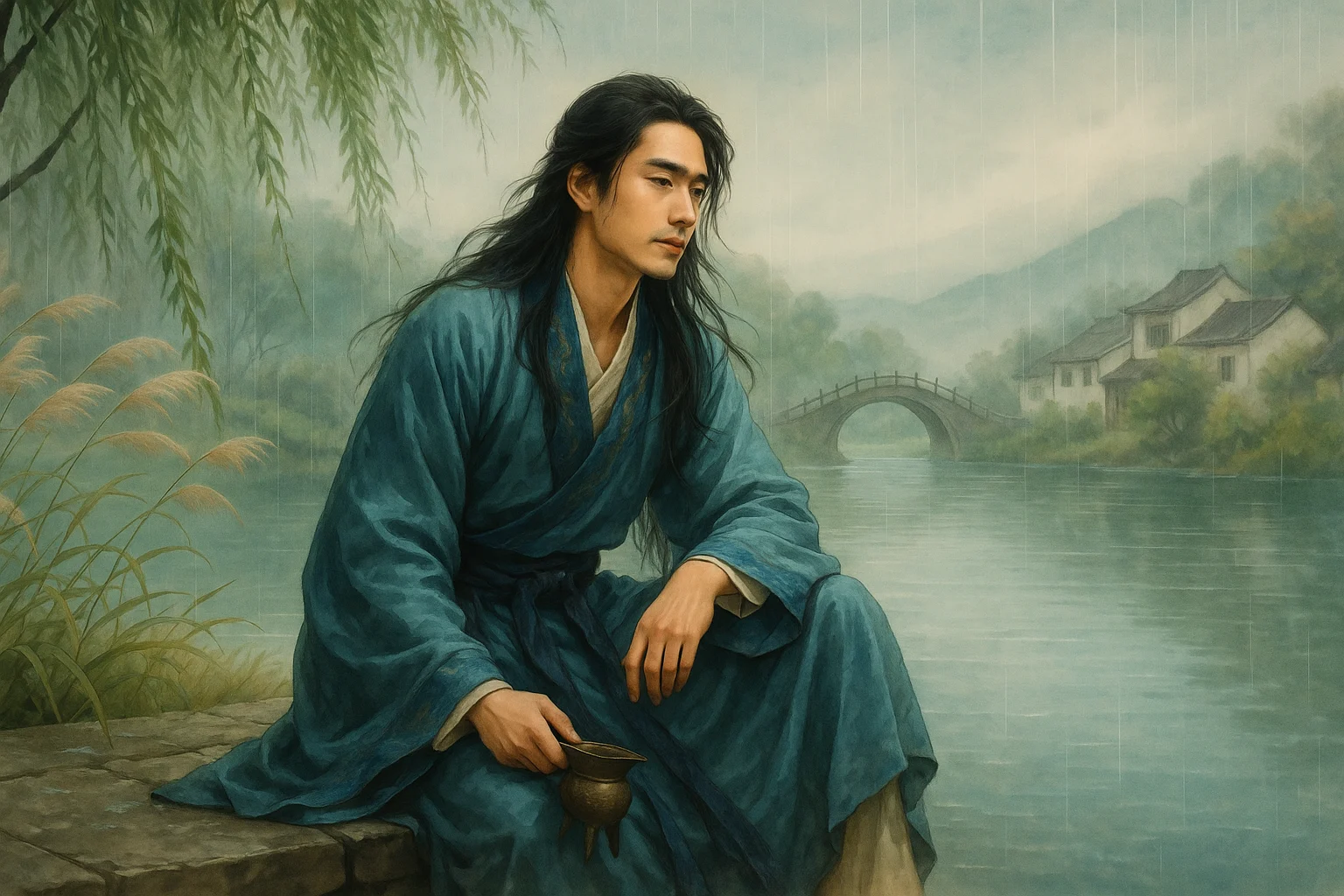
Feng Yansi (冯延巳 903 - 960), courtesy name Zhengzhong, was a native of Guangling (modern-day Yangzhou, Jiangsu) and a renowned ci poet of the Southern Tang during the Five Dynasties and Ten Kingdoms period. Rising to the position of Left Vice Director of the Department of State Affairs (Zuo Puye Tongping Zhangshi), he enjoyed the deep trust of Emperor Li Jing. His ci poetry forged a new path beyond the Huajian tradition, directly influencing later masters like Yan Shu and Ouyang Xiu, playing a pivotal role in the transition of ci from "entertainment for musicians" to "literary expression of scholar-officials."






